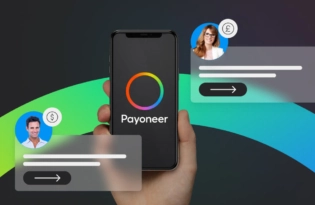HomeResourcesGeneral PaymentsAccount Receivable
Think global payments for healthier travel experiences
The digital travel industry will reach $11.4 trillion by 2027. And naturally, the industry involves international payments. Payment processes on an international scale can be challenging. However, the rewards for your business success are phenomenal. Learn how you can tap into and personalize this trend.

Making and receiving international payments within the travel industry can be complex and fraught with challenges. But when handled the right way, the rewards can be huge: Expanded business, expanded revenue, and loyal customers.
The digital travel industry continues to rapidly evolve, due in large part to the efficiencies afforded to consumers, property owners and third-party providers by increasingly affordable and powerful technologies. Combined with the ease in which travel can be researched, scheduled and reviewed with mobile devices, this has driven a marked increase in international vacation travel on a global scale. In fact, travel experts predict that the digital travel space worldwide will expand at an annual rate of 3.8% to reach $11.4 trillion by 2027.
Delivering a personalized experience in a complex environment
Today’s travelers are more connected, more informed and more selective about the places they travel and the travel providers they choose. Travelers now expect their digital and mobile experiences to make their lives easier. This is especially true when they’re making a purchase. According to Juniper Research, digital transactions are expected to rise to just over $8 trillion by 2020, from $4.9 trillion in 2015.
In addition, travelers are now also more discerning about brands. They are more likely to select brands that they feel are catering to them on a personal level vs. those they believe offer ‘generic’ travel services.
Personalization is the top priority among current trends in the digital travel industry. People value unique experiences, regardless of whether they are taking a holiday or a business trip. According to an online poll, 90% of travelers worldwide stated that a generic travel service is simply not enough to ensure their business.
Digital transformation – payment is there too
To stand out in today’s competitive digital travel environment, it’s critical that your business be personal in its approach to customers and providers, and that you add inherent value to what you offer them. Personalization and client retention requires sophistication, enthusiasm and technology solutions. Think about every touch point you have with your travelers and providers globally. Each one manages inquiries in a different currency, and different methods of payment are required — but you need to ensure that your solutions will delight them with ease and simplicity.
For example, if your current payment system does not offer the ability to collect payments in different currencies and different geographies, or doesn’t offer the highest levels of security and fraud detection, you might be risking your ability to truly reach new markets.
Similarly, global operators often need to ensure funds are readily available to pay for services rendered and easily link corresponding transactions. But, unless you have the right technology to manage those payments and connect each transaction ID and its corresponding payment, you probably won’t be able to make the big jump you were hoping for.
Online channels open business opportunities
Whether your business provides vacation rentals or transportation services, is an online marketplace or is geared entirely to providing travelers with the best possible experience, catering to an international audience can be rewarding. But if managed incorrectly, it can also be expensive and time-consuming. So it’s important to know the facts when planning your global strategy and expansion.
According to ADI (Adobe Digital Insights) travel industry market research , 41% of business and 60% of leisure travel arrangements are made online. Therefore, your business must meet customers and providers’ needs not only in person but also online. This creates an opportunity to delight customers, and also to expand your business, but at the same time presents additional risk.
For example, if the increasingly internet-savvy generation runs into an overly complex travel booking or payment process on your website or in your marketplace, they could very quickly take their business to one of your competitors. Therefore, It’s critical that your payment technology investments help you create a user experience that is seamless, easy and secure, to ensure that your customers leave satisfied and return when they are planning their next trip.
The rising risk of fraud
But making and receiving international payments can be complex, and comes with challenges. These include the high costs that traditional financial institutions charge for wire transfer payments, laborious and complex financial reconciliation processes, dealing with already thin margins (i.e. airlines always trying to cut costs and find fees to charge), a fragmented global tour operator market, and aggregators that often need mass payout options in different currencies — all of which lead to a higher risk of fraud.
Research shows that three most common types of fraud in the travel industry are stolen payment details, cyber breaches of online booking platforms and stolen security credentials. These attacks are costing travel intermediaries $21 billion each year. And that figure is predicted to increase 20% by 2020, exceeding $25 billion.
It is estimated that credit card fraud represents between 1% and 2% of an airline’s revenue in the indirect channel. This presents a $2.4 – 4.8 billion dollar problem for airlines alone — and that’s just a fraction of the travel industry. Travel merchants overall lose an average of 0.44% of annual revenues to online fraud, according to data compiled by CyberSource. Pair that figure with the airline figures, and it’s clear why credit card fraud remains a top concern across the entire industry.
Spark your global growth
It’s time to ensure you’ll no longer need to worry about the mounting complexities involved in international payments. From protection against payment fraud to governance, you’re in good hands with Payoneer.
Payoneer Enterprise, your 3600 global payment solution, improves travel experiences by offering a full range of unmatched capabilities, such as mass payouts, reconciliation, currency management, comprehensive fraud protection (KYC), automated compliance services, and much more. Best of all, we’re able to help you make fast, easy payments to over 190 countries and regions and in 70 currencies.
Related resources
Latest articles
-
Made in India for the World: The State of Indian Cross-Border eCommerce
The Indian eCommerce market has grown significantly in the last few years. As a result, many cross-border businesses have undergone a fast-paced digital transformation and contributed to surpassing the government-set $400 billion target of trade within a single year.
-
Defying the odds: How Ukrainian businesses thrive during war
One year post-war, Ukraine’s businesses adapt and thrive amidst adversity. Entrepreneurs showcase resilience, reflecting national tenacity. Many diversify, venturing into e-commerce and digital realms. Despite hurdles, 44% of SMBs aim for growth, with 36% hiring. Their grit underscores Ukraine’s enduring spirit amid challenges.
-
An 8-point Checklist for Finding the Best Payment Provider
There’s huge potential to expand into ASEAN markets. But only for online sellers that accept local payment methods. Finding a trusted payment solution can be a worry and a challenge. Use this checklist to vet potential payment partners. With the right payment support, the sky’s the limit!
-
How to bill your international clients
Want to learn how to bill international clients when you’re based in the Philippines? In this article we spoke to three leading business owners who shared their tips to working successful international work. Learn how they collect payments and more below.
-
How to nail your direct-to-consumer payment strategy
Asia-Pacific offers massive potential for DTC ecommerce. But cross-border payments can be a headache. We share an actionable strategy for DTC payments that’ll remove DTC payment hazards and expand your business with ease. What are you waiting for?
-
How to pay international vendors in order to promote profits and reduce risk
In this article, we’ll share our expert tips and best practices for paying international vendors, so you can focus on growing your business. From choosing the right payment method to navigating currency exchange, we’ve got you covered.














